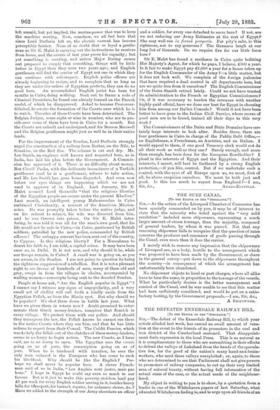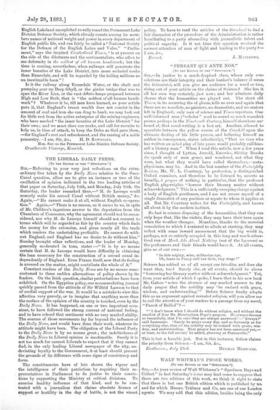THE DEFEATED ENNERDALE RAILWAY BILL.
[To TILE EDITOR OF THE " SPECTATOR.1
Sia,—The defeat of the Ennerdale Railway Bill, to which your article alluded last week, has caused no small amount of vexa- tion at the event to the friends of its promoters in the coal and iron district of the Cumberland seaboard. That disappoint- ment finds expression in the local Press. This is as natural as it is complimentary to those who are unremitting in their efforts- to defend the valleys of Lakeland from the hands of the specula- tive few, for the good of the nation's many hand-and-brain- workers, who need these valleys unexploited ; or, again, to those who are determined to see that Pailiament shall not give powers to promoters of railway companies, to cut up their very limited area of nitural beauty, without having full information of the actual state of the case, or the actual needs of the neighbour- hood.
My object in writing to you is to show, by a quotation from a leader in one of the Whitehaven papers of last Saturday, what educated Whitehaven feeling is, and to urge upon all friends of an English Lakeland nnexploited to rally round the Permanent Lake District Defence Society, which already counts among its mem- bers names of national weight and power in every department of English public life, and can fairly be called a "National Society for the Defence of the English Lakes and Vales." "Parlia- ment," says the inspired Cumberland Times, "is at present on -the side of the dilettante and the sentimentalists, who affect to see deformity in the noblest of all human handiwork; but the time is coming, nevertheless, when railways will penetrate the inner beauties of the Lake District, into more secluded nooks -than Ennerdale, and will be regarded by the toiling millions as an inestimable boon " !
Is it the railway along Ennerdale Water, or the shaft and pumping gear up Deep Ghyll, or the girder bridge that was to span the River Liza, or the vast debris-heaps proposed between High and Low Beck, that is "the noblest of all human handi- work"? Whatever it be, till men have learned, as your article puts it, that England's truest wealth does not consist in the amount of coal and iron she can drag to bank, we may look out for little rest from the active enterprise of the mining engineers, who have marked "the inner beauties of the Lake District" for their own; and we must close our ranks, and call for recruits to help us, in time of attack, to keep the Dales as God gave them, —for England's rest and refreshment, and the rearing of a noble peasantry.—I am, Sir, &c., H. D. RAWNSLEY,
Hon. See. to the Permanent Lake District Defence Society. Crosthwaite Vicarage, Keswick.



































 Previous page
Previous page